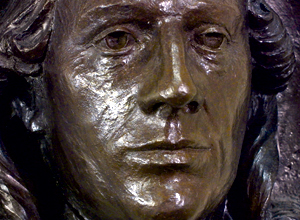 |


|
Summer 2003 | Volume 26, Number 3 | Features | ||||||||
| John Wesley’s 300th Birthday 300 Years After His Birth, His Legacy Lives On This year, thousands of clergy, scholars and lay Christians are marking the 300th anniversary of the birth of one of the most influential figures in the history of Christianity. Conferences, worship services, spiritual pilgrimages, theatrical performances and other events commemorate the life and ministry of John Wesley, the founder of Methodism.
Among the significant events of the 18th century often singled out by historians are the Industrial Revolution, the French Revolution and John Wesley’s Methodist Revival. Over a period of 50 years, Wesley gave voice and vision to a powerful renewal movement within the Anglican Church, traveling as many as 250,000 miles on horseback to preach the gospel to anyone who would listen in England and abroad. His followers, called Methodists, agreed to avoid evil, do good and diligently pursue a maturing relationship with God. Venues for celebration of the Wesley tercentennial are many and diverse, such as the University of Manchester, Canterbury Cathedral and Oxford’s Lincoln College in England; the Bahamas Wesleyan Fellowship in Nassau, Bahamas; and Atlanta’s Emory University. Ironically, John Wesley himself may have blanched at the uproar. As SPU Professor Randy Maddox writes in the essay, "Reclaiming Holistic Salvation," Wesley, far from being on a mission of self-acclaim, sought the renewal of all creation after the image of God. His legacy, says Maddox, is meaningful to anyone who seeks holiness of heart and life.
|
